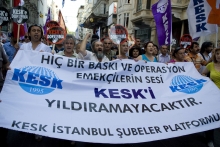Turkish authorities target trade unions

Lami Özgen, the president of KESK, was one of those detained. Following his release on 29 June, he exposed that the arrested union members were being held in ‘F-type high-security’ prisons built for those convicted of terrorism.
In F-type prisons, inmates are kept three to a cell. They get just half an hour visiting time with their family each week. Visitors and prisoners are separated by a glass screen and talk via telephone – only once a month are they allowed to meet in the same room. Union officials are not normally given permission to visit.
Of the 58 named in the arrest warrants, six avoided being detained because they were not at home when the police arrived. As of 3 July, 28 remained in prison. In addition, the homes of a further 14 members, not named on the warrants, were also searched.
Within 12 hours of the arrests, KESK members had organized protests across Turkey. In Istanbul some 4,000 demonstrators held an evening protest rally in the city centre, with parallel actions taking place in other cities.
"All those with arrest warrants against them have been charged with the same thing,’ Lami Özgen confirmed. ‘That is, [attending] KESK meetings and other activities between 8 August 2011 and the end of June 2012." Turkish authorities claim that these meetings are illegal because, they say, they took place on the order of the Union of Kurdistan Communities (KCK) which is linked to the banned Kurdish Workers’ Party (PKK).
The ‘illegal activities’ cited in the arrest warrants include a union meeting on 8 October 2011 in Ankara with the theme of ‘Human Life in a Free and Democratic Turkey’ (ironically, the police had granted permission for this meeting to take place); a one-day strike on 21 December in defence of the right to strike and collective bargaining; and campaigning by the teachers’ union against changes in their members’ working practices.
Lami Özgen believes that media reporting of the activities has given the prosecutor the ability to make the claim that the events are linked to the KCK. One news agency in particular, FIRAT, which publishes in Turkish, English and Kurdish, has reported on KESK’s activities.
The series of arrests last month is far from a one-off attack on trade unions in Turkey. On 13 February, 15 female members of KESK were arrested because of meetings they had held to discuss International Women’s Day on 8 March. The prosecutor has claimed that these women also have connections to the KCK. Six of them have been released on bail, but nine remain in an ‘F-type’ prison, awaiting the start of their trial on 4 October.
Lami Özgen stresses that his members are not the only people facing these kinds of charges. Many writers, journalists, parliamentary deputies and students are also in jail. On 29 June, four days after the arrests of the KESK union members, journalists demonstrated in Istanbul in support of 95 jailed colleagues. On 2 July, a major trial started, in which the 205 defendants – including journalists and a well-known publisher – are being charged with having connections to the KCK.
In its Country Reports on Human Rights Practices for 2011, the US State Department lists concerns of abuses in Turkey. Top of the list is the country’s defective justice system. The report criticizes Turkey’s very broad laws against terrorism, its lengthy pre-trial detention, lack of transparency, restricted defence access to evidence, and the connections between prosecutors and judges.
Tim Baster and Isabelle Merminod

